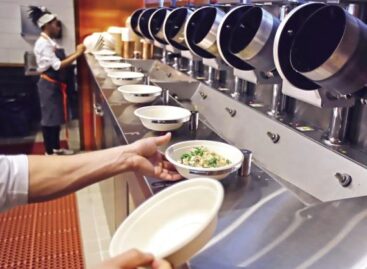Magazine: Business Days 2020 – Our conference wasn’t cancelled…
Even the coronavirius couldn’t beat our Business Days conference, which we organised together with the Chain Bridge Club in September. Thanks to the strict health protection protocol, the nearly 550 participants could feel completely safe during the 4 days of the 15th Business Days, between 20 and 24 September 2020. This year the conference’s title was ‘Trade festival – on stage: The FMCG sector’.

László Benedek
managing director
Viresol

Imre Tímár
owner
Tanner Trade
On the first day the moderators were László Benedek, managing director of Viresol and Imre Tímár, the owner of Tanner Trade.

Raymund Petz
member of the board of directors
GKI
The keynote speaker was Raymund Petz, a member of GKI’s board of directors. He revealed that according to the forecast of the European Commission, even if the EU’s economy keeps growing after the pandemic, the GDP will only reach the 2019 level by 2022.

Andreas Christou
managing director
RetailZoom
Andreas Christou, CEO of RetailZoom spoke about how COVID-19 increased the importance of those grocery stores that are close to where shoppers live, e.g. stores belonging Hungarian-owned retail chains. Shoppers visited these less often than before the pandemic, but they purchased almost twice as much.
Staying healthy and having a job matter the most
Wholesalers’ representative stepped on the stage first for a roundtable discussion.

Sándor Kovács
national sales director
METRO
Sándor Kovács, national sales director of METRO told: they had to achieve a balance between staying profitable and protecting jobs during the pandemic, and it very much seems that the company managed to pull this off.

István Dobi
owner
Dél-100
István Dobi, the owner of Dél-100 revealed that the key to their success in the spring was being able to convince workers to back even those difficult steps that were necessary to achieve the company’s goals.

István N.Szabó
managing director
Z+D
István N. Szabó, managing director of Z+D said: for his company preserving liquidity was the main priority during the pandemic, which they managed to do with the help of supplier partners.

Gergely Bálint
director of corporate sales
Nestlé
Gergely Bálint, director of corporate sales at Nestlé explained that his company was able to cope with the crisis well, which has to do with its large portfolio and the fact that different business lines were affected differently by the lockdown.

Zsolt Vuleta
general manager and sales director
Borsodi Sörgyár
Borsodi Brewery reacted to the pandemic by transforming its operations and adapting its marketing programmes to the restructuring taking place in retail channels – said general manager and sales director Zsolt Vuleta.

György Galántai
commercial director
Hell Energy
György Galántai, commercial director of Hell Energy revealed that they decided to look on the difficult period as an opportunity, so they innovated to satisfy new-type needs, recruited new workers, etc.

Csaba Kanizsai Tóth
managing director
FÁN Group
Csaba Kanizsai Tóth, managing director of FÁN Group stressed the importance of constant communication with customers and trade partners.

László Hovánszky
managing director
METSPA
László Hovánszky, managing director of Metspa called attention to the importance of the superb performance by suppliers during the first wave of the pandemic.
Record sales by Hungarian retailers

Tamás Csongovai
head of marketing
SuperShop

László Szilágyi
owner
ActionCOACH ML
Tamás Csongovai, head of marketing at SuperShop and László Szilágyi, the owner of ActionCOACH ML were the moderators of the next roundtable discussion, where the representatives of Hungarian-owned retail chains, franchises, tobacco shops and pharmacies reported: they realised record sales in March, but this was followed by a more difficult period. The representatives of Hungarian-owned retail chains, franchises, tobacco shops and pharmacies realised record sales in March.

László Szili
commercial director
Reál Hungária
László Szili, commercial director of Reál Hungária told that the panic-buying trend arrived to their stores with a small delay, and the chain profited from this when competitors had already run out of products.

András Papp
managing director
Manna ABC
András Papp, managing director of Manna ABC spoke about how many people in Budapest switched to night shopping to reduce the risk of catching the virus, so Manna stores stayed open at night.

Kornél Saltzer
managing director
Dél-100
Kornél Saltzer, managing director of Dél-100 informed that both their wholesale and retail units were winners of the pandemic situation, as sales grew by double-digit numbers.

Zoltán Tóth
managing director
Dohánybolt Ellátó
Zoltán Tóth, managing director of Tobacco Supplies (Trafik.hu), owner of DigInStore and operator of TrafikTV gave a presentation about the sales performance of tobacco shops: although like-for-like cigarette sales were down 10 percent, the share of FMCG products in sales by tobacco shops is getting bigger.
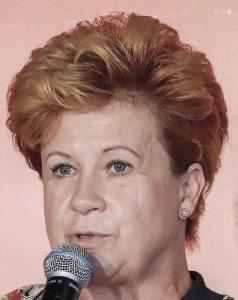
Zsuzsanna Lóczki
sales and marketing director
K+K Family
Zsuzsanna Lóczki, sales and marketing director of K+K Family talked about how they kept the new workers that had been recruited just before the first wave of the pandemic: retailers accepted the price increase they proposed and in certain cases new contracts were signed.

György Sóskuti
corporate sales director
Bonafarm
György Sóskuti, corporate sales director of Bonafarm Group explained that since the lockdown came just before Easter, the group diverted large quantities of fresh products from the HoReCa channel to retail and from export to domestic supply.
Develop, modernise, innovate
Mr Saltzer shared the lessons they learned from their store modernisation programme, e.g. sales by their modernised stores jumped minimum 30 percent in small towns and villages. Mr Tóth added that if a shop gives shoppers what they expect and a little more, consumers will value them more than the units of large and well-known chains. Mr Papp said he was very sorry that the Budapest region was left out of development funding programmes, and he hopes that from next year retailers in the capital city will also be granted access to financial resources.
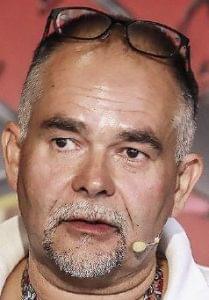
Zoltán Soós
CEO
Wonderduck Agency
Zoltán Soós, CEO of Wonderduck Agency Zrt. gave a presentation that compared classic plastic loyalty cards with interactive digital cards and applications, introducing their WonderPass solution, which is much more efficient than classic e-DM solutions.
Expect the unexpected…
Ms Lóczki told that this year’s biggest lesson to be learned was the importance of reacting rapidly, especially to changes in consumption habits. Mr Sóskuti underlined the fact that the whole market shifted in the direction of thinking collectively and increasing efficiency, as this strategy is more effective – and retailers have agreed with manufacturers in this. Mr Saltzer thinks there is no way back: the pandemic generated new consumption habits that are transforming shopping for good. Mr Tóth called attention to the importance of localisation.

István Korbély
owner
Eurofamily
Mr Korbély said the pandemic shed light on the fact that retailers and product manufactures must always calculate with unexpected situations.
nézve – szerinte kulcskérdés lesz az üzletmenet szempontjából, hogyan tér vissza a vásárlóközönség a járványt követően.
A special cause: Hungarian products

Zoltán Házi
vice president
retail services dept. at BKIK

Sándor Baja
managing director
Randstad
In the end-of-day roundtable discussion the representatives of associations, organisations and interest representing bodies were talking about the most important topics. The moderators were Zoltán Házi, vice president of the retail services department of the Budapest Chamber of Commerce and Industry (BKIK) and the owner of HáSiTó and Sándor Baja, managing director of Randstad.

Ildikó Balázs
co-president
OKSZ
Ildikó Balázs, co-president of the National Trade Association (OKSZ) revealed that this spring OKSZ members strengthened their cooperation with suppliers and basically with every partner, in order to ensure there is uninterrupted product supply during the COVID-crisis.
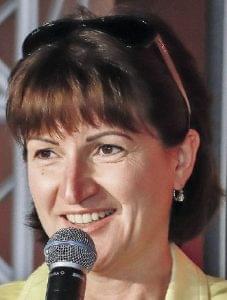
Katalin Neubauer
secretary general
MNKSZ
Katalin Neubauer, secretary general of the Hungarian National Trade Association (MNKSZ) added that the communication between the two associations was honest, and this can remain so in the long run.

Katalin Süle
agriculture vice president
NAK
Katalin Süle, agriculture vice president of the Hungarian Chamber of Agriculture (NAK) stated: it would be key to give priority to Hungarian groceries, as the production criteria here is one of the strictest in the world, and at the same time Hungarian farmers and food makers would also profit from this.

Eszter Benedek
managing director
Hungarian Product Nonprofit Kft.
As a reaction to this Eszter Benedek, managing director of Hungarian Product Nonprofit Kft. called attention to how those food companies that process imported ingredients were facing sourcing problems during the pandemic.
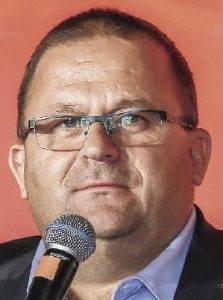
Dr. Lajos Bognár
state secretary for food chain supervision Ministry of Agriculture
Dr Lajos Bognár, state secretary for food chain supervision at the Ministry of Agriculture expressed his view that food adulteration can only be fought if the state doesn’t only perform inspections, but also creates the necessary regulatory background and educates the public.
Tamás Éder, president of the Federation of Responsible Food Manufacturers (FÉSZ) opined that retailers can only be expected to put Hungarian products on store shelves if these groceries are competitive.
Efficiency and competitiveness
Mr Baja asked the question: Can Hungarian agriculture be competitive volume-wise and if yes, how?

Tamás Éder
president
Federation of Responsible Food Manufacturers (FÉSZ)
Mr Éder answered that Austria, the Netherlands and Belgium have already showed that large quantities can be also be produced in small countries.
Mr Bognár said that agri-businesses can become more competitive by investing in innovation, digitalisation, automation and robotics.

Gyula Vidács
president
Hungarian Franchise Association
Gyula Vidács, president of the Hungarian Franchise Association analysed the latest trends in the world of franchises. He spoke in detail about franchise networks built on various demographic groups and the growing importance of the online segment.
We should talk more about the importance of a healthy diet
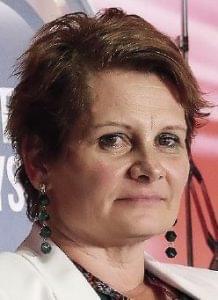
Emese Antal
diatetitian, head of
TÉT Platform
Have the eating habits of Hungarians changed? Emese Antal, dietitian, sociologist and the head of TÉT Platform (Diet, Lifestyle and Physical Activity Platform) revealed that Hungarians now stay healthy longer than before, in part because people have realised the importance living a healthy life. Still, she thinks that despite the positive changes we should talk about the importance of healthy diet more often.
When the topic of the deposit-return system came up, Mr Éder stressed the importance of having a system that doesn’t created a competitive disadvantage for Hungarian food companies vis a vis foreign market players. Ms Balázs informed that they teamed up with manufacturers and retailers to develop a deposit-return system proposal which the ministry can study. Ms Neubauer Katalin added: they hope retail won’t turn into a battle zone for the system.
Retail Award of Excellence for Hungarian Products
The award ceremony of the Retail Award of Excellence for Hungarian Products took place at the Business Days conference. Dr Lajos Bognár, state secretary for food chain supervision at the Ministry of Agriculture, and on behalf of the founders Eszter Benedek, managing director of Hungarian Product Nonprofit Kft. and Zsuzsanna Hermann, managing director and editor-in-chief of Trade magazin presented the prizes to the winners.
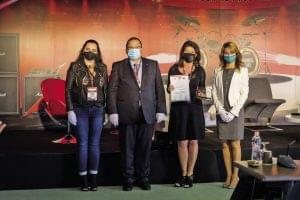
Idén a Magyar Termékekért Kereskedelmi Nívódíjat az Auchan Magyarország nyerte el. Ezúton is gratulálunk!
This year the bronze medal went to Coop Hungary Zrt., CBA Kereskedelmi Kft. won the silver medal and Auchan Magyarország Kft. walked away with the gold medal. Two special prizes were also awarded: SPAR Magyarország Kereskedelmi Kft. got one for its special efforts in promotional cooperation and ALDI Magyarország Élelmiszer Bt. was rewarded for its excellent trademark communication.
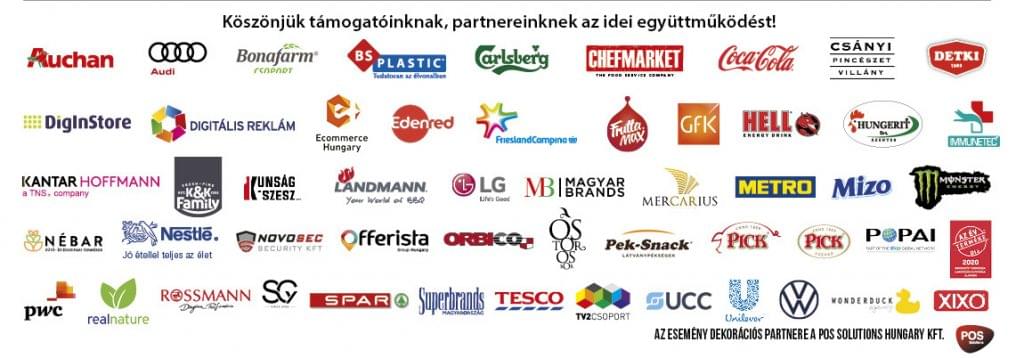
//
Related news
The Hungarian Food Book is 50 years old
🎧 Hallgasd a cikket: Lejátszás Szünet Folytatás Leállítás Nyelv: Auto…
Read more >






